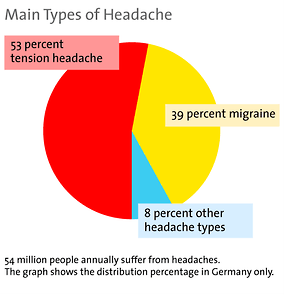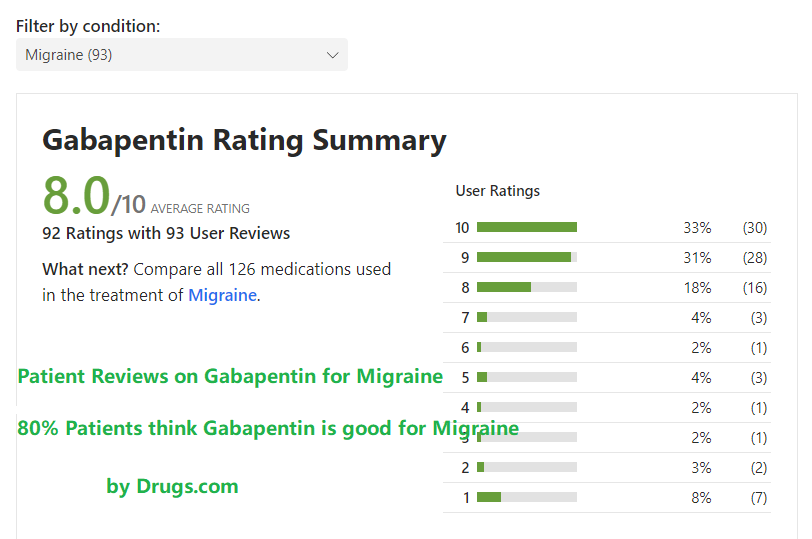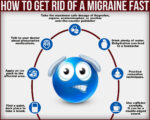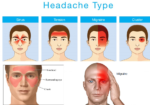Do you experience pain in head area just like you have tied a tight band around your head? If this pain occurs when you are under stress, there is a possibility that you are suffering from tension headache.
Though we all get headaches occasionally, but sometimes it is more than just a headache and it can also be a symptom of some kind of illness.

Tension headache is quite common types of headache, still many people aren’t aware about what it is and the cause is still unknown. Tension headache emerges from muscle contraction in neck and face area and can be caused due to stress, anxiety or because of strong emotions.
If you are suffering from tension headaches, there is no need to worry as there are a plenty of non-drug treatments available that can help get tension headache relieved. You should take enough rest and maintain healthy habits. Exercise and healthy food can also help a lot.
Most tension headaches occur due to stress or anxiety. It can continue to exist for a short period of 30 minutes or even for a long period such as a week. If your headache occurs repeatedly all the time, it may be because of chronic headache that can last for years.
Stress has been a common problem these days and that why a lot of people complain of tension headaches. The pain caused due to tension headaches from tension headaches can be on sides of head, front top, throbbing and can be on back or neck. Stress is the major cause as when you are under stress, the muscles surrounding the neck, eyes or head get tighter and other problems that are responsible for tension headaches are
Excessive exercise
- Poor diet
- Sleep issues
- Hormones
- Chronic fatigue
- Poor posture
Well you cannot avoid daily stress, but can manage to keep stress under control. You can also meditate to keep stress under control. There are many other ways to relieve tension headaches and eliminate stress like going for acupuncture or massage therapy that helps soothing body and soul. Some well known natural therapies like yoga can help you tone muscles. Psychotherapy can teach you how to deal with stress in a better way and this way you can reduce the frequency of tension headaches.
People who suffer from anxiety or are under stress are the ones who get tension headaches more than others do. Painkillers can give you temporary relief but natural therapies can help you fight tension headaches.
- Stress, anxiety and depression makes tension headaches even worse by
- Reducing relaxation chemicals present in our body like endorphins
- Increases muscle tension
- Stuffing your body with all stress chemicals like adrenaline
- Reducing the tolerance level to strains and stressors
- Prevent the pain-killers effects
Women are under stress more than men as they are constantly struggling to get everything right be it their financial problems, parenthood issues, interpersonal or marital problems. Working women are stressed out because of their job commitments.
How to Prevent Headache ?
A lot of patients order fioricet or buy fioricet in order to stop their tension headache or general headaches.
A headache is pain or discomfort in the head or face. Headaches vary greatly in terms of the location and intensity of the pain, and how often the headaches occur. The brain tissue doesn’t have pain-sensitive nerve fibers and doesn’t feel pain. But, other parts of the head can be responsible for a headache including:
- A network of nerves that extends over the scalp
- Certain nerves in the face, mouth, and throat
- Muscles of the head, neck, and shoulders
- Blood vessels found along the surface and at the base of the brain

- Headache Types
normally 53% headaches are tension headaches and 39% are migraines. Other kinds of headaches only occupy eight percent.
The best way to relieve your headaches are preventing your headache before it begins.
You have to know your headache triggers. Normally it is because of stress. But there are a lot of headache triggers there including weather,strong smell, Hair Accessories, sex and Exercise, Poor Posture, Cheese, Red Wine, food, Cold Cuts, Skipping Meals, Smoking, Caffeine,
If you can identify your most common triggers, you may be able to cut off headaches before they start. The best way to accomplish this is through a headache diary.
Keep a daily log of foods you eat, stressful events, weather changes, and physical activity. Whenever you have a headache, record the time it starts and stops.
How long the headache lasted and what made it stop
Review your diary with your doctor to identify triggers or a pattern to your headaches. This can help you and your doctor create a treatment plan. Knowing your triggers can help you avoid them.
Emotional stress is one of the most common triggers of migraines and tension headaches ( stress headaches). Migraine sufferers are generally found to be more emotional and highly affected by stressful events. During stressful events certain chemicals in the brain are released to combat the situation (known as the ‘fight or flight’ response). The release of these chemicals can provoke blood vessel changes that can cause migraine headaches.
Stress is also an important factor in tension headaches. Tension headaches can either be episodic or chronic. Episodic tension headache is usually triggered by an isolated stressful situation or a build-up of stress; it can usually be treated by over-the-counter painkillers. Daily stress such as from a high-pressure job can lead to chronic tension headaches. Treatment for chronic tension headaches usually involves stress management, counselling, and possibly the use of antidepressant or anxiety reducing medication.

Stress management involves learning to be able to control stress and relax. Everyone has periods of stress. Stress has benefits in that it can result in us pushing ourselves and getting things done. This can precipitate a headache. Simply taking some deep breaths and maybe tensing then relaxing your muscles can relieve occasional mild stress. Regular stress may require learning to say “no”, not taking too much on. Becoming fit, eating regularly, and proper sleep can help combat stress. Learn better organizing skills, not setting standards that are too high and deal with problems as they arise, can all help. As can, adopting stress management techniques such as meditation, biofeedback, relaxation therapy and yoga.
Lifestyle changes that may help to prevent your headache, include:
- Use a different pillow or change sleeping positions.
- Practice good posture when reading, working, or doing other activities.
- Exercise and stretch your back, neck, and shoulders often when typing, working on computers, or doing other close work.
- Get more vigorous exercise. This is exercise that gets your heart beating fast. (Check with your health care provider about what kind of exercise is best for you.)
- Have your eyes checked. If you have glasses, use them.
- Learn and practice stress management. Some people find relaxation exercises or meditation helpful.
- Eat Regularly, Eating balanced meals throughout the day will help keep your blood sugar on an even keel
- Physical Therapy, Physical therapy combines exercise and education to reduce pain and improve range of motion
Migraine prevention
Some people can prevent migraines by avoiding triggers. Others have prevented migraines successfully through relaxation techniques, acupuncture, or exercise. However, these therapies alone don’t work for everyone.
Some people also need treatment with medication to reduce the number of migraines they have. The drugs used to prevent migraines are different from drugs that to treat migraines once a migraine starts.
Drugs that prevent migraines, such as gabapentin, must be taken on an ongoing basis to work properly.
Over-the counter pain relievers such as acetaminophen, aspirin, ibuprofen, and naproxen are effective against many types of headaches. But avoid taking these drugs continuously, as this can result in medication overuse headaches or rebound headaches — headache pain that returns as soon as the pills have worn off.
For frequent or severe headaches, talk to your doctor about prescription medications that help prevent them.
Your doctor may recommend that you take a prescription medicine every day to prevent headaches. You may want to take this medicine if:
- Over-the-counter medicines don’t work to stop your headaches.
- You’re taking drugs to stop headaches more than 3 times a week.
- You get a headache more than 15 days a month.
Medicines used to prevent tension headaches include:
- Antidepressants, such as amitriptyline.
- Seizure medicines, such as topiramate and Gabapentin
- Medicines that relax muscles, such as tizanidine.
- Antianxiety medicines, such as buspirone.
To compare gabapentin with placebo for use as a prophylactic agent in patients with migraine (with or without aura).
NIH has list an article about
Efficacy of gabapentin in migraine prophylaxis
STUDY DESIGN AND TREATMENT:
After screening, a 4-week, single-blind, placebo baseline period was followed by a 12-week, double-blind, treatment period. The 12-week treatment period consisted of a 4-week titration phase and an 8-week stable-dosing phase.
During the 4-week titration phase, patients were started on one 300-mg capsule of gabapentin or matching placebo. Patients were titrated weekly from 900 mg/day (end of week 1) to 2400 mg/day (end of week 4) and had to be receiving a stable dose of study medication by the end of the titration period.
Study medication was to be given on a three-times-a-day dosing regimen.
Their conclusion: Gabapentin is an effective prophylactic agent for patients with migraine. In addition, gabapentin appears generally well tolerated with mild to moderate somnolence and dizziness.
For more information, please check Efficacy of gabapentin in migraine prophylaxis.
By patient reviews, 80% patients think Gabapentin is good for Migraine Prevent:

Pain Medications, Pain Relief, and Pain Management







